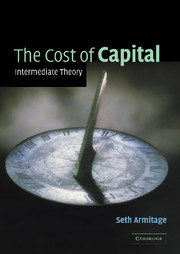Book contents
- Frontmatter
- Contents
- List of figures
- List of tables
- Preface
- Part I Expected Returns on Financial Assets
- 1 The cost of capital under certainty
- 2 Allowing for uncertainty: contingent states
- 3 The capital asset pricing model and multifactor models
- 4 The consumption-based model
- 5 The equity risk premium
- Part II A Project's Cost of Capital
- Part III Estimating the Cost of Capital
- References
- Index
2 - Allowing for uncertainty: contingent states
Published online by Cambridge University Press: 05 June 2012
- Frontmatter
- Contents
- List of figures
- List of tables
- Preface
- Part I Expected Returns on Financial Assets
- 1 The cost of capital under certainty
- 2 Allowing for uncertainty: contingent states
- 3 The capital asset pricing model and multifactor models
- 4 The consumption-based model
- 5 The equity risk premium
- Part II A Project's Cost of Capital
- Part III Estimating the Cost of Capital
- References
- Index
Summary
This chapter presents a theory of choice between consumption now and claims to future consumption. It is similar in essence to the theory of intertemporal choice under certainty presented in Chapter 1. Assets provide claims to future consumption. Their prices, and the expected returns on them, are explained as the outcomes of choices made by utility-maximising individuals. The chapter aims to give an idea of how the analysis ‘works’, and to point to some of the worries about it. It sets the scene for the explicit models of the expected returns on assets that will be developed in Chapters 3 and 4.
Uncertainty about the future will be represented using the concept of contingent states. An individual in the present (date 0) is assumed to be able to envisage more than one contingent state, or state of the world that might come about at a given future date. Only one of the states envisaged actually will come about. The individual is assumed to be able to attach a probability to the occurrence of each state and to know in advance what will happen in each contingent state – i.e. the outcome or outcomes relevant to the analysis. There is no vagueness about the outcomes in any state; the uncertainty is entirely about which state will actually materialise. In effect, each contingent state is defined by a particular outcome of a single variable, or a combination of outcomes of more than one variable.
- Type
- Chapter
- Information
- The Cost of CapitalIntermediate Theory, pp. 20 - 37Publisher: Cambridge University PressPrint publication year: 2005



